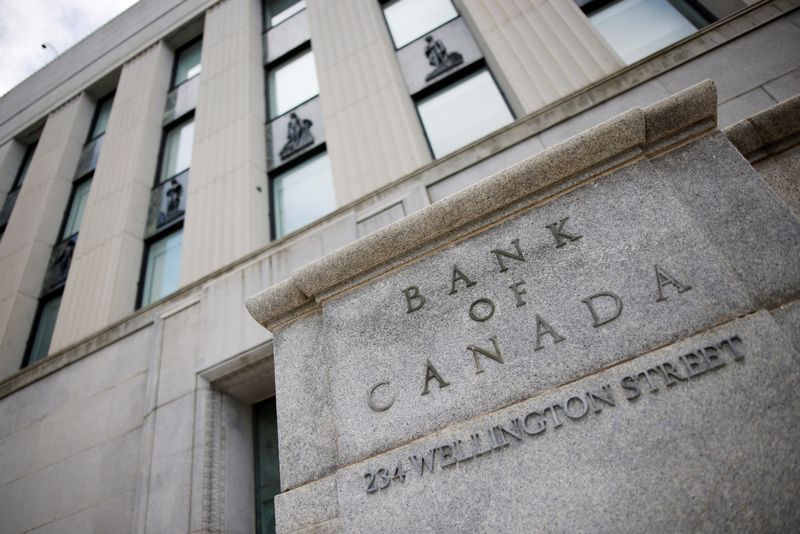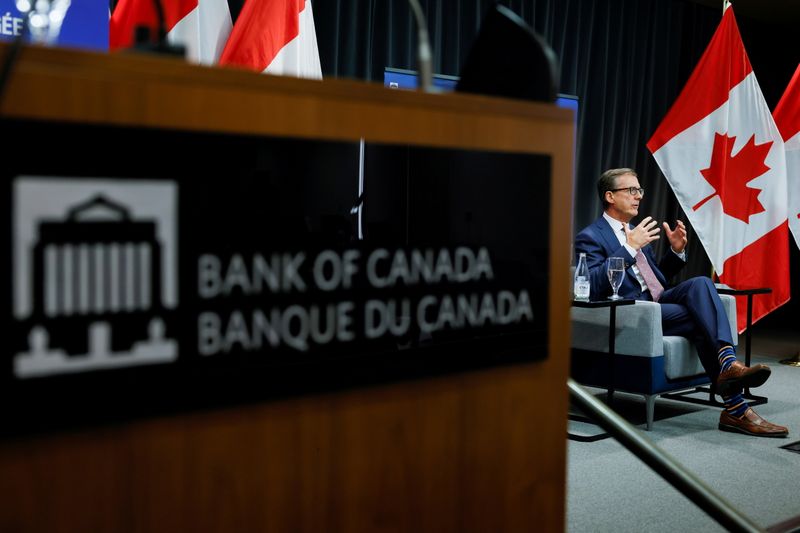By Mumal Rathore
BENGALURU (Reuters) - The Bank of Canada will cut its overnight interest rate on Wednesday by 25 basis points to 4.50% amid expectations that inflation will continue to fall, according to a large majority of economists polled by Reuters.
With the economy slowing and unemployment edging higher, the central bank is then expected to cut rates twice more in 2024, although only a slim majority of economists are forecasting a policy rate of 4.00% by the end of this year, with risks tilted toward fewer rate cuts rather than more.
While forecasters have consistently predicted at least three Bank of Canada rate cuts in 2024 since early this year, the chance of a fourth reduction in borrowing costs now rests on a knife's edge, in part because the U.S. Federal Reserve has yet to begin reducing rates.
Although Canadian inflation has eased further to within the BoC's 1%-3% target range amid a weakening of the job market and softening corporate outlook, sticky core inflation and wage growth could warrant caution.
However, nearly three-quarters of the economists surveyed in the July 16-19 poll, or 22 of 30, expect the BoC will cut its policy rate again to 4.50% on July 24. That is in line with interest rate futures pricing
The Canadian central bank trimmed borrowing costs last month, marking its first rate cut in four years.
The BoC is expected to pause its easing cycle at its September meeting before resuming the rate cuts in October and December. That would suggest the BoC will cut rates twice before the Fed begins its easing cycle, now widely expected to happen in September.
Andrew Kelvin, head of Canadian and global rates strategy at TD (TSX:TD) Securities, said second-quarter CPI inflation "is tracking below what the Bank (of Canada) had forecast in April and the business outlook survey was extremely dovish ... the pieces are in place for the BoC to cut rates again at its meeting next week."
UPSIDE INFLATION RISKS
Although inflation, as measured by the annual change in the consumer price index, was forecast to ease further in coming quarters, staying around 2% through this year and 2025, risks are skewed towards higher price pressures, economists said.
"Additional rate cuts beyond the one we see in July will require inflation decelerating from what we've seen in the last few months. We do expect it will happen," Kelvin said.
After July, the BoC will cut its policy rate twice more this year, to 4.00% by the end of 2024, according to a slight majority of economists in the poll - 16 of 30. While 10 of them expected the rate to be at 4.25% or higher, only four predicted it would reach 3.75%.
All five big Canadian banks expect a total of four rate reductions this year.
The Canadian central bank may gain more confidence if the once red-hot housing market remains relatively calm.
Average home prices have been declining as existing and aspiring homeowners deal with sharply higher mortgage payments compared with rock-bottom rates during the COVID-19 pandemic.
"The BoC has been clear that it intends to ease policy only gradually and we think it will remain more concerned with upside risks to inflation than downside ones in the near term," said Tony Stillo, director of Canada economics at Oxford Economics.
"If inflation fails to slow, as we expect ... or house prices rebound too quickly the BoC may delay further easing and hold the policy rate higher for longer."
Nearly 70% of economists in the poll, 11 of 16, said the end-2024 overnight rate was more likely to be higher than they expect rather than lower. Five said the opposite.

Canada's economic growth was expected to average 1.0% this year before bouncing back to 1.8% in 2025.
(Other stories from the Reuters global economic poll)
